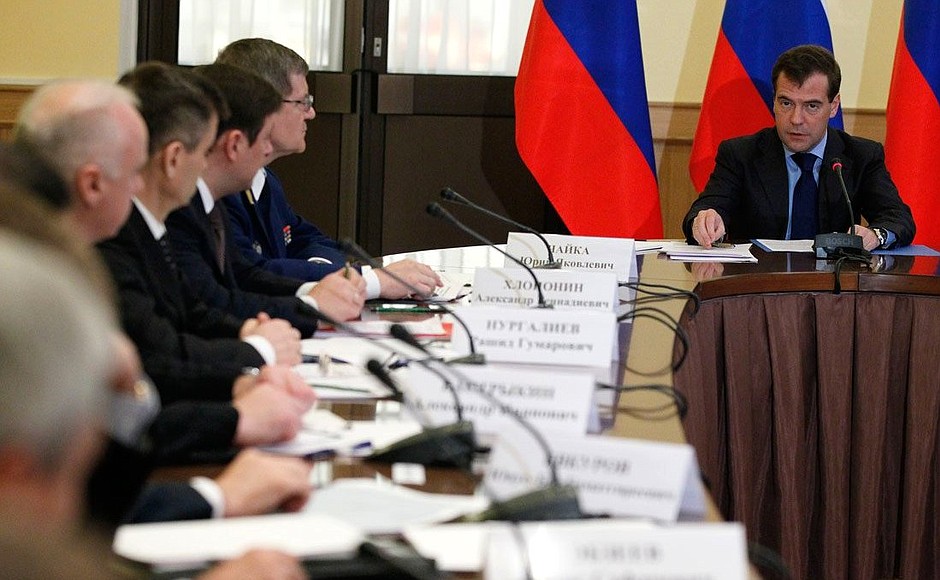
President of Russia Dmitry Medvedev: Colleagues,
The subject of today’s meeting is not new, unfortunately, and is indeed traditional for meetings of this kind in the North Caucasus Federal District. This is the issue of guaranteeing stability and security in the North Caucasus Federal District and throughout our country in general.
I decided specially to hold this meeting in expanded format with the law enforcement and security agency heads, the heads of supervisory bodies, and the governors of the district’s regions taking part, so as to give us the chance to set our clocks once again, given that the last big discussion on this subject took place a bit less than a year ago in Stavropol. On that occasion I set the task of normalising the situation in the North Caucasus. Now we need to look at what has and has not been accomplished since then. Specific measures were set then for combating terrorism and fighting crime. They included improving the coordination between the different agencies, and bolstering anti-terrorism protection at infrastructure sites and facilities, as well as improving personnel in the law enforcement and security agencies, the prosecutor’s office, and the courts.
Some progress has been made in giving people risking their lives to fight terrorism at least the necessary of support. Acting on my decisions, the state authorities set new bonuses and preferences for these people, despite the crisis year the country was going through. This does not mean that all issues are settled now and all breaches closed, and that all that could be paid for this kind of work is being paid, but it is nonetheless a step forward. I would like to hear from the agency chiefs on how they view the future now, how well the bonus system is functioning, and how we should progress in the context of the upcoming changes, above all in the Interior Ministry system.
”The last big discussion on this subject took place a bit less than a year ago in Stavropol. On that occasion I set the task of normalising the situation in the North Caucasus. Now we need to look at what has and has not been accomplished since then.“
The criminal situation in the federal district remains problematic. We need to admit frankly that it has seen little improvement overall, although progress has been made in some specific areas. Many useful operations have been carried out (this is the truth and we need to recognise this too), and more than 60 terrorism-related crimes have been prevented, and this means lives saved. This is something that no one should forget. A considerable number of bandits have been neutralised, including bandit group leaders, although overall the situation has not radically changed and the bandit groups have not become less active. Unfortunately, their activities are merging increasingly with those of organised crime, and sometimes it is hard to see the dividing line between terrorist activity and common crime. The number of shootings, explosions, murders of civilians, religious leaders and law enforcement personnel has not decreased, and we have to recognise that people in many places continue to live in a climate of fear and anxiety for themselves and their families.
A total of 64,000 crimes have been registered in the district over the first ten months of this year. The number of premeditated murders has dropped by 13 percent in the country as a whole, but it rose by 5 percent in the district. The number of crimes solved decreased by almost 10 percent, though I think this figure requires separate analysis. I am not sure this is all so bad, because statistics in our country can be deceptive and people have little faith in them. Let me make this clear to the heads of our law enforcement agencies: we cannot believe the statistics because they are often nonsense. We must tackle this problem, including the reports the Interior Ministry compiles. The new law On the Police Force currently being passed contains the provisions required to make these statistics more reliable.
We need to analyse the reasons for this state of affairs today and work out what further steps we should take. Usually I am told that there are no problems in organising work to guarantee security, that the various services are fully staffed, and that anti-terrorist commissions and operations headquarters are at work in every republic and territory. But we are to take a deeper look at the state of affairs.
This year, 50 counter-terrorist operations and more than 4,500 combat operations have taken place in the North Caucasus Federal District. This gives us an average of five counter-terrorist operations a month and 15 combat operations a day. These are sizeable figures. But I stress that these actions have saved people’s lives. This really is extremely important. But at the same time, I have to understand – as you all do – just how effective these various operations ultimately are.
We also should discuss what help the law enforcement and security agencies are receiving from the regional governors and local authorities. I am absolutely convinced that the regional governors could provide more support in this respect. Not enough is done to ensure security at public places where large numbers of people gather. This has already had tragic consequences on several occasions this year. There are also few efforts being made to keep the public informed and warned.
”The criminal situation in the federal district remains problematic. We need to analyse the reasons for this state of affairs today and work out what further steps we should take.“
Although we have spoken about this in the past, there is still not enough effort being put into cooperating with religious leaders, especially with Muslim leaders, given that this is the North Caucasus.
I want to stress in particular that although the entry into force of the law On the Police Force will bolster the federal component in the police force’s organisation, the regions will continue to play a very big part in ensuring security (you all need to realise this), not just by providing organisational support, but also by financing individual regional law enforcement programmes. I know that such programmes exist, but there are some problems with their implementation. Let’s discuss too what we could do in this area.
Let’s start. Mr Bortnikov, as chairman of the National Antiterrorism Committee, will present the open part of his report with the media present, and we will then continue our work behind closed doors. You have the floor, Mr Bortnikov.
Director OF THE FEDERAL SECURITY SERVICE ALEXANDER BORTNIKOV: Thank you.
Mr President, participants in today’s meeting,
Effectively combating the underground bandit groups is an important part of ensuring stability in the North Caucasus Federal District. More than 50 counterterrorist operations have been carried out in the region since the start of the year, and a large number of combat operations have taken place, during which 332 members of bandit groups were killed while putting up armed resistance, and 530 bandits and their accomplices were detained. More than 1,000 arms, 390 homemade explosive devices, more than 1,5 tons of explosives, around 8,500 shells and grenades, and 135,000 cartridges for firearms were seized from secret caches and hideouts.
We pay particular attention to stopping terrorist acts while they are still in the preparation phase, and this has enabled us to prevent 66 terrorist crimes from being committed. In Makhachkala, Stavropol, and Grozny, for example, homemade explosive devices of 3 to 60 kilograms TNT equivalent, filled with shrapnel and placed in sites where large numbers of people gather, were detected and defused. A number of underground laboratories producing homemade explosive devices have been shut down.
The security and preventive measures carried out have resulted in an almost two-fold drop in the number of terrorism crimes committed in the Republics of Chechnya and Ingushetia compared to 2009. The operations carried out have also resulted in a decrease in bandit activity in Daghestan. The terrorist attacks carried out in August and September in the centre of Pyatigorsk, the central market in Vladikavkaz, and at the police checkpoint on the Kavkaz federal highway on the administrative border with Ingushetia have been solved.
In general, the work done so far this year has resulted in an overall drop in the amount of terrorist activity in the federal district by 20 percent compared with the same period last year. But the situation in the district remains complicated nevertheless. The bandits continue to carry out blasts and shootings, which kill law enforcement personnel and civilians. The ideologues of terrorism continue to lure young people into their activities, including by training them as suicide bombers.
Clearly, normalising the situation in the North Caucasus requires additional measures, not only security and preventive measures, but also steps to stimulate the region’s economy, invigorate the job market and bring down unemployment.
<…>
